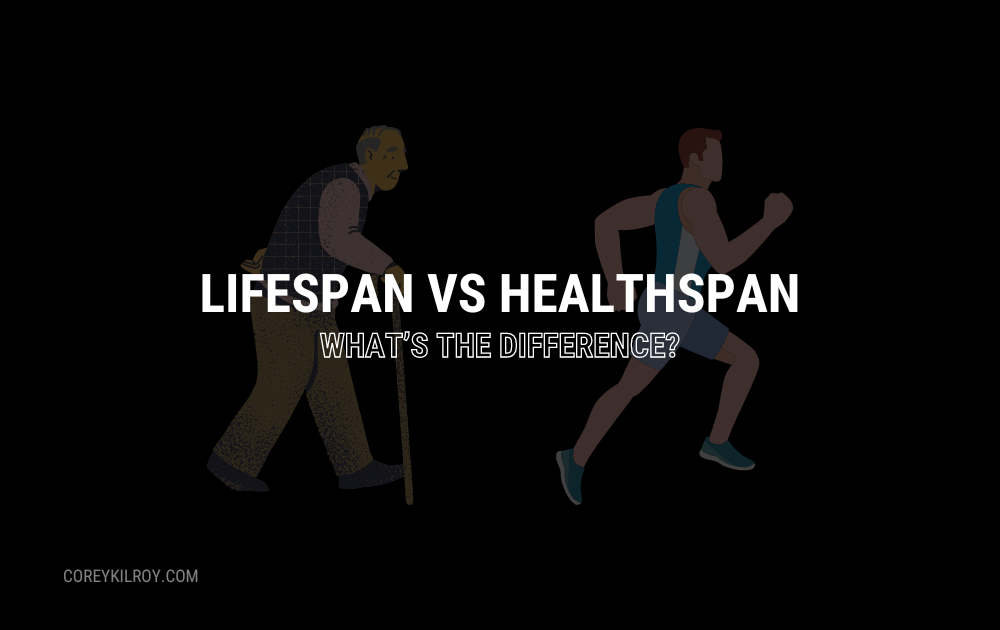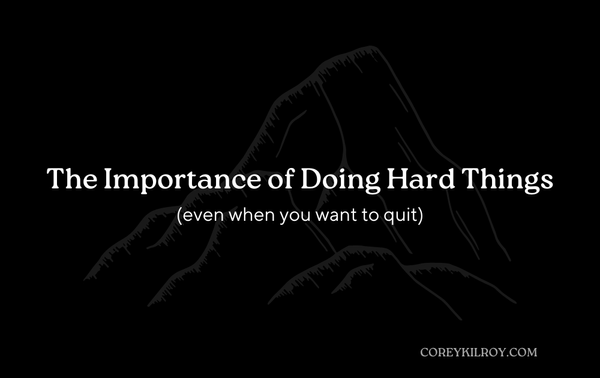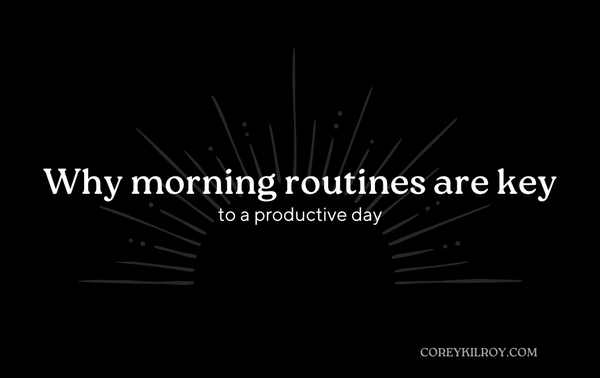Lifespan vs. Healthspan: What's the difference?

We all want to live longer.
Luckily, over the last century, researchers have noted that our life expectancy has increased dramatically.
People are living longer than ever before.
And while that’s a cause for celebration, have you ever considered the quality of those “extra” years?
You may have heard the terms “life span” and “health span” and used them interchangeably, but they have vastly different meanings.
Lifespan
Lifespan, also known as life expectancy, is defined as the estimated number of years in which a person will live.
For example, the average lifespan of a person living in the 1900s was estimated to be about 47 years old. Now, that number has increased to an average of about 80 years old.
This is due to the ever-growing advancements in technology and education today.
Medicine is getting more advanced and people are starting to learn how to optimize their lives through social media and increased literature.
This increase in life expectancy is great and all, but what could be better?
Healthspan
Healthspan is the expected years a person lives while in good health, without disease, chronic illness, and disability.
Despite these rapid advancements in healthcare, technology, and self-education, the onset of health problems and chronic illness remains a problem in society today and a significant factor in a person’s overall health and well-being.
There are said to be several pertinent factors that determine a person’s healthspan.
These include a person’s genetic makeup, mental and emotional health, and lifestyle choices.
The current healthspan in society today sits at about 66 years of age, which has only increased with people living longer, but many living with chronic illness and disability.
It’s often misunderstood that people believe healthspan is primarily a result of heredity.
For example, someone may assume, “My mother has heart disease, so I’m destined to suffer the same fate.”
This isn’t always true, though.
A study from 2016 on identical twins showed that heredity is not the primary cause of most chronic diseases.
Genetics plus exposure accounts for the heredity factor.
This means a person may have a genetic predisposition to a disease, but environmental factors and lifestyle choices are potential triggers that activate the disease process.
Mental and emotional health may also affect a person’s healthspan.
For example, it’s known that increased stress in a person’s life will increase the release of cortisol by the adrenal glands.
While this stress response is a protective mechanism, repeated and continued release results in the onset of several diseases, such as cardiovascular disease, cognitive impairment, and other chronic conditions.
Lifespan vs Healthspan - What’s the big deal?
While lifespan has increased, granting people to live longer than ever before, the healthspan of these people has not improved.
Who wants to live longer when the latter half of their years of life are spent suffering?
Not me…
It’s found that cardiovascular and respiratory disease, diabetes, and cancer account for 80% of deaths related to chronic illness.
And almost 60% of these deaths occur in people over 70.
I’m currently pursuing a career in healthcare, and the amount of patients I see with a page-long list of medications on their chart baffles me.
These high blood pressure, high cholesterol, and type II diabetes medications all mask the symptoms that these patients created for themselves.
How? Their lifestyle choices.
The general belief is that aging automatically results in disease and disability, but does it have to?
Wouldn’t healthy lifestyle choices make a difference?
Don't we have control and an option to extend the healthspan for ourselves?
I think so.
How to improve Healthspan
I’ll always preach that healthy lifestyle choices should be a lifelong practice, but society has created an environment that makes these decisions awfully difficult to maintain.
It’s ultimately up to us to make the decisions that better promote a healthier lifestyle.
Look at areas around the world in the Blue Zones, for instance. These are the areas of the world where the people live the longest and healthiest throughout their lifetimes.
They have healthspan down to a “T”.
Some of the Blue Zones around the world include
- Icaria, Greece
- Okinawa, Japan
- Ogliastra, Sardinia (Italy)
- Nicoya Peninsula (Costa Rica)
Here’s some advice I’ve learned about improving healthspan:
Nutritional intake
- Limit processed foods: avoid processed foods and saturated fats. Instead, shop the perimeter of the grocery store and enjoy healthy, whole, organic foods.
- Avoid Sugar: Limit the amount of sugar and complex carbohydrates. Carbs are very important for energy production, but too many simple carbs/sugars can lead to many health issues down the line. The white bread, sugary coffee, and sodas can stay away.
- Get enough protein: Adequate protein intake will not only keep you fuller for longer but it helps to maintain muscle mass and increase recovery. Choose lean meats such as poultry, fish, and game meats like bison and venison (yum).
- Mediterranean diet: The Blue Zones tend to eat foods that typically fall into the Mediterranean diet. I’m not saying this should be your exact diet (everyone’s body is different), however, I am saying many of these foods should be on your grocery list to try. These foods include lots of:
- Vegetables
- Healthy oils (olive oil, avocado oil, etc)
- Fish/seafoods
- Nuts/legumes
- Occasional meats like poultry & red meat (average consumption of meat in blue zones is about 2 oz or less about five times per month)
Physical activity
- Exercise frequency: Motion is lotion. It's important to exercise and move our bodies every day. A sedentary lifestyle does nothing but create negative health issues in the future. At the very least, walk, stretch, or get out into nature on a frequent basis.
- Goal setting: physical activity can be tough when motivation is lacking. I always say that discipline and consistency produce results when motivation is nonexistent. Try setting goals like SMART goals to keep yourself motivated and accountable.
- Exercise buddies: The greatest motivator and accountability tool has always been being a part of a group of like-minded individuals. Having a gym buddy or workout class that you frequently go to will keep you motivated and accountable when chasing your fitness goals.
Cognitive Health
- Learn: Do not sit in front of a computer or television all day. Social media and the internet is rotting our brains and it’s up to us to fight it. Instead:
- Read
- Exercise
- Learn a new skill
- Start a new hobby
Purpose and happiness in life come from working on the things that set our souls on fire. Those things that make our eyes light up when we think about it. Constantly learn and improve yourself instead of consuming brain-rotting entertainment on social media.
- Socialize and connect: We are a social species. As humans, we need social connection in life. Isolation and loneliness do nothing but increase the risk of chronic illness, cardiovascular disease, stroke, and dementia. Consider connecting with people in an activity you enjoy, a belief system you resonate with, or a cause you’re passionate about. The “lone wolf” mentality can only get you so far.
Preventative Health
- Get checked out: The majority of the population is walking around every day with some kind of deficiency. Sufficient electrolytes, vitamins, and minerals play a major role in the quality of our everyday lives. Luckily, there are millions of brands and supplements out there that can keep you in check. Get blood work done and a proper workup from a physician. This will rule out any deficiencies or medical issues that are holding you back from optimizing the quality of your life.
- Sleep: Recovery and sleep are major pillars of holistic health and wellness. Without proper recovery, our bodies cannot function to the best of their abilities. Aim for about 7-9 hours of sleep each night. If you struggle with sleep, try adding magnesium, L-theanine, or tart cherry juice to your bedtime routine. Never rely on melatonin for sleep. This only disrupts your circadian rhythm and makes your sleep worse over time.
- Mental health: Stress, anxiety, and depression play a major role in our healthspan. Our minds are powerful tools. High stressors in our lives can result in the development of health issues over time. High blood pressure, heart disease, stroke, obesity, and diabetes can all develop simply because our mental health isn’t in check. Try meditation, journaling, walks in nature, or speaking to a trusted friend.
- Eliminate substance use: This is easier said than done, obviously, but it’s well-known that substance use causes the intake of harmful toxins to enter the body and damage your health over time. Smoking, nicotine products, alcohol, drugs… These substances create detrimental health issues over time. Find help today and your future self will thank you.
In the end…
The medical advancements in our world today have increased the overall lifespan of individuals all around the nation.
However, improving our healthspan will lengthen the amount of time we have in life with good health and freedom from diseases.
It’s up to us to make the right choices that promote this healthspan in the future.
Be proactive and start making those choices today to protect our bodies.
Be well and Keep Pluggin.
Until Next Time, C.



